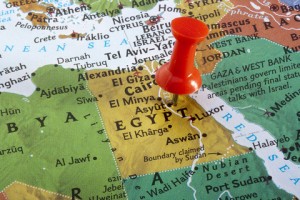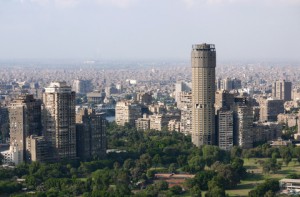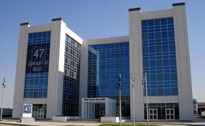
[Updated Oct 2020] A guide to serviced offices and office space to rent in Cairo as well as general information that may be useful if you are thinking of renting office space in Cairo.
For further offices information or to search office space for rent in Cairo just click. Or contact us for any other query.
History & Geography
In Arabic Cairo means ‘the Conqueror’, an apt name for a city which has literally stood the test of time and today remains one of the most well-known, prosperous and dynamic cities in the world. Located on the east bank of the famous Nile River in northern Egypt, Cairo is directly south of where the river leaves the desert and branches into the Nile Delta region approximately 100 miles south of the Mediterranean. Due to its strategic location, Cairo and its surrounding area have been occupied since ancient times. At the turn of the 4th century, the Romans established a fortress in the area named Babylon, which still exists and is the oldest structure in Cairo today. The city was officially founded in 969 by General Gawhar al-Siqilli of the Fatimid Caliphate, which conquered Egypt from Tunisia. Cairo initially took four years to construct and was intended as the new capital of the Caliphate. However, for the next two hundred years, Egypt continued to be administered from the city of Fustat, until it was burned down to stop it falling into the hands of the Crusaders in 1168. From then on Cairo was the official functioning capital of Egypt. The city fell under the rule of the famous opponent of the Crusaders Saladin in 1169 but was then captured by the Mamluks, a special class of slave soldiers who rose up and seized Egypt. Cairo subsequently continued to flourish and expanded significantly. Later in the Middle Ages, the city was devastated several times by the Black Death and subsequently fell under the rule of the Ottoman Empire. The city continued to expand under the Ottomans and eventually became the second most important city in the empire after Istanbul. Cairo was occupied by the French under Napoleon in 1798 but was then captured by the British and handed back to the Ottomans. Eventually, an Albanian named Muhammad Ali Pasha gained control of the city and became known as the founder of modern Egypt. In 1882 the British again invaded the city and this time stayed until Egypt regained independence in 1922. Since then Cairo has grown dramatically in size and population and is today the 16th largest metropolitan area in the world.
2011 Egyptian Revolution
On January 25th 2011 a popular uprising started in Egypt which has culminated in the resignation of long-time ruler Hosni Mubarak. The uprising took the form of a non-violent campaign of civil resistance, of which Cairo was at the epicentre. Cairo’s Tahrir Square specifically was at the centre of the revolution. Among the issues spurring the revolution were low wages, endemic corruption, food price inflation, lack of free speech and police brutality. Currently, the country is going through a process of social and political reform and attempting to transition to a stable government.
Economy
Cairo is the economic hub of Egypt and the region. A full two-thirds of the country’s GNP is produced in the Cairo metropolitan region. The city is constantly expanding and one building in five is less than 15 years old, a testament to Cairo’s thriving real estate and construction industries. Cairo is also the media centre of Egypt, with almost all the country’s major publishing houses, TV and radio stations based in the city. Cheap public transportation and medical care help keep the cost of living in Cairo fairly low, however many still struggle to make ends meet in the city.
Pollution
Because Cairo is overpopulated and has an infrastructure system that cannot cope, pollution, both air and land, has become a major problem in the city. A permanent haze hangs over the city due to unregulated vehicle emissions, trash burning, urban industrial operations, and a large amount of unregistered lead and copper smelters in the city. These factors are exacerbated by Cairo’s lack of rain and tall buildings and narrow streets. Cairo also suffers from land and water pollution, mainly due to the amount of garbage dumped every day. Every year 10,000 to 25,000 people die in Cairo from pollution-related illnesses.
 Tourism
Tourism
Tourism is one of the most important economies in Egypt, with every year seeing over 12 million tourists visit the country. Many tourists visit Cairo itself or must at least pass through the city. Giza, the site of the great pyramids and the Sphinx is only 20 kilometres from the city and the ancient burial ground of Saqqara is 30 kilometres away. The Egyptian Museum in Cairo is also a major draw, featuring over 120,000 items on display. Also, the Mosque of Muhammad Ali Pasha, built in the early 19th century, is a major landmark. Old Cairo, which contains remnants of many older cities within Cairo’s boundaries, such as Coptic Cairo, is an exciting and mysterious quarter which is also visited by many tourists in search of a taste of ancient Cairo.
Transportation
Getting around Cairo is fairly easy, as the city boasts a comprehensive rail and subway system, as well as buses and taxis. The Cairo Metro is the fastest and most efficient way around the city, though gets very crowded during rush hour. Traffic in Cairo is notoriously bad, featuring aggressive drivers and almost daily gridlock. Ramses Railway Station connects Cairo with the other major cities of Egypt, and Cairo International Airport is the busiest airport in the country. The airport is best accessed by taxi or shuttle bus.
 Office space for rent in Cairo
Office space for rent in Cairo
The recent political upheaval has affected the Egyptian economy, however, at present, it is resuming its healthy rate of growth. Many construction projects in Cairo have been delayed but over the next year, approximately 70,000 square metres of Grade A space will come on the market. The districts of New Cairo and Smart Village are growing in popularity with businesses wanting to avoid the polluted and congested downtown. The average rent for Grade A office space is at USD 23 per square metre per month but is expected to decrease in the future.
Our office space search, advisory and acquisition services are FREE, always. Our Cairo office space brokers and agents are globally regulated by the Royal Institution of Chartered Surveyors (RICS) ensuring the highest standards of commercial property advice and service at all times.
